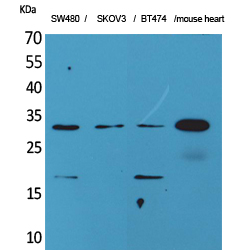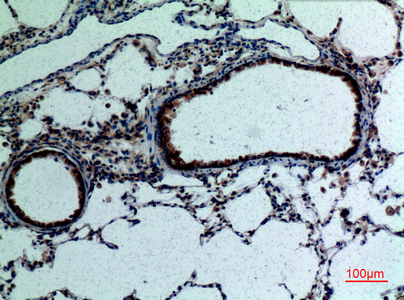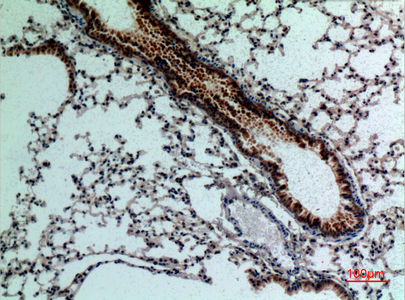FGF-18 Polyclonal Antibody
- Catalog No.:YT5181
- Applications:WB;IHC;IF;ELISA
- Reactivity:Human;Mouse;Rat;Sheep
- Target:
- FGF-18
- Fields:
- >>MAPK signaling pathway;>>Ras signaling pathway;>>Rap1 signaling pathway;>>Calcium signaling pathway;>>PI3K-Akt signaling pathway;>>Regulation of actin cytoskeleton;>>Pathways in cancer;>>Chemical carcinogenesis - receptor activation;>>Melanoma;>>Breast cancer;>>Gastric cancer
- Gene Name:
- FGF18
- Protein Name:
- Fibroblast growth factor 18
- Human Gene Id:
- 8817
- Human Swiss Prot No:
- O76093
- Mouse Gene Id:
- 14172
- Mouse Swiss Prot No:
- O89101
- Rat Gene Id:
- 29369
- Rat Swiss Prot No:
- O88182
- Immunogen:
- The antiserum was produced against synthesized peptide derived from the C-terminal region of human FGF18. AA range:158-207
- Specificity:
- FGF-18 Polyclonal Antibody detects endogenous levels of FGF-18 protein.
- Formulation:
- Liquid in PBS containing 50% glycerol, 0.5% BSA and 0.02% sodium azide.
- Source:
- Polyclonal, Rabbit,IgG
- Dilution:
- WB 1:500 - 1:2000. IHC: 1:100-300 ELISA: 1:20000.. IF 1:50-200
- Purification:
- The antibody was affinity-purified from rabbit antiserum by affinity-chromatography using epitope-specific immunogen.
- Concentration:
- 1 mg/ml
- Storage Stability:
- -15°C to -25°C/1 year(Do not lower than -25°C)
- Other Name:
- FGF18;Fibroblast growth factor 18;FGF-18;zFGF5
- Observed Band(KD):
- 28kD
- Background:
- The protein encoded by this gene is a member of the fibroblast growth factor (FGF) family. FGF family members possess broad mitogenic and cell survival activities, and are involved in a variety of biological processes, including embryonic development, cell growth, morphogenesis, tissue repair, tumor growth, and invasion. It has been shown in vitro that this protein is able to induce neurite outgrowth in PC12 cells. Studies of the similar proteins in mouse and chick suggested that this protein is a pleiotropic growth factor that stimulates proliferation in a number of tissues, most notably the liver and small intestine. Knockout studies of the similar gene in mice implied the role of this protein in regulating proliferation and differentiation of midline cerebellar structures. [provided by RefSeq, Jul 2008],
- Function:
- function:Stimulates hepatic and intestinal proliferation.,similarity:Belongs to the heparin-binding growth factors family.,
- Subcellular Location:
- Secreted .
- Expression:
- Lung,Ovary,
MiR-21 regulated hair follicle cycle development in Cashmere goats by targeting FGF18 and SMAD7 ANIMAL BIOTECHNOLOGY QiaoLing Zhang WB Human,Sheep skin samples HaCaT cell
- June 19-2018
- WESTERN IMMUNOBLOTTING PROTOCOL
- June 19-2018
- IMMUNOHISTOCHEMISTRY-PARAFFIN PROTOCOL
- June 19-2018
- IMMUNOFLUORESCENCE PROTOCOL
- September 08-2020
- FLOW-CYTOMEYRT-PROTOCOL
- May 20-2022
- Cell-Based ELISA│解您多样本WB检测之困扰
- July 13-2018
- CELL-BASED-ELISA-PROTOCOL-FOR-ACETYL-PROTEIN
- July 13-2018
- CELL-BASED-ELISA-PROTOCOL-FOR-PHOSPHO-PROTEIN
- July 13-2018
- Antibody-FAQs
- Products Images

- Western Blot analysis of SW480, SKOV3, BT474, mouse heart cells using FGF-18 Polyclonal Antibody. Secondary antibody(catalog#:RS0002) was diluted at 1:20000 cells nucleus extracted by Minute TM Cytoplasmic and Nuclear Fractionation kit (SC-003,Inventbiotech,MN,USA).

- Immunohistochemical analysis of paraffin-embedded rat-lung, antibody was diluted at 1:100

- Immunohistochemical analysis of paraffin-embedded mouse-lung, antibody was diluted at 1:100



